Is Phuket Safe To Visit? 8 Safety Tips for Travelers
Phuket is a pretty safe place to go on vacation, but here are a few things travelers should watch out for to stay safe.
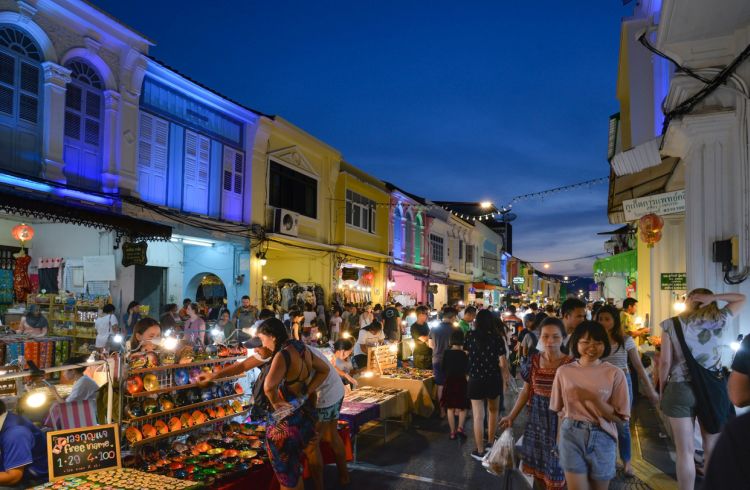 Photo © iStock.com/Nirad
Photo © iStock.com/Nirad
Thailand’s largest island, and most popular beach resort, Phuket is one of the busiest tourist destinations in Southeast Asia. This stunningly beautiful place can also be dangerous for travelers who aren’t cautious. Here are eight safety tips for your holiday to Phuket, gleaned from my many trips to this paradise.
- Forget renting a motorbike
- How to book tours safely
- Water sports dangers
- Dealing with Phuket's taxi mafia
- Boat trips can be deadly
- How to eat safely
- Dangers for female tourists
- Other scams to watch out for in Phuket
Forget renting a motorbike
Phuket’s roads are busy with tourists riding small motorbikes they’ve rented for as little as USD$8 per day – the cheapest way to get around the island, which has high taxi prices, triple those in most other parts of Thailand. But it’s confounding that so many foreigners who’ve never even sat on a motorbike back home think it’s safe for them to operate one in a country renowned for its horrific road safety.
If you choose to ride consider travel insurance and be sure to comply with its requirements, such as riding with a helmet and being appropriately licensed to ride in your home country at your destination.
Consider this: according to a 2019 New York Times report, Thailand has the world’s second-highest road deaths per capita. And for motorbike deaths, it ranks first. Even for experienced motorcyclists, Thailand’s dense, unpredictable traffic is very dangerous. So, if you’re a novice rider renting a motorbike on holiday in Phuket, you’re taking a giant risk with your health.
How to book tours safely
From the moment travelers get off the plane at Phuket airport, they’re inundated with offers for tours around the island. Tiger tours, jungle tours, temple tours, island tours, food tours, adventure sport tours, and on and on. Unfortunately, a significant number of the companies that sell these tours actively look to scam tourists.
They charge upfront and then refuse to provide the tour, or later inflate the price, among other tactics. When booking through a tour business always choose one that has a high number of favorable online reviews on websites such as Google or Tripadvisor.
Another way to minimize your risk of being scammed is to book all your tours through the activities desk at a large hotel, even if you’re not staying there. These more expensive hotels cannot afford to have irate guests in their lobby yelling about how they were scammed on a tour organized by the hotel. It’s too damaging to their reputation and to their core business, so these hotels pick honest tour providers and police them strongly.
By comparison, the hundreds of tiny Phuket businesses that sell tours have much less to lose by upsetting one of their customers. Granted, you will pay more for a tour booked via a large hotel, but you’ll save on stress.
Water sports dangers
The ocean around Phuket is so warm and translucent which is why many travelers are drawn to water activities such as jet skiing, paragliding, and banana boat riding. Unfortunately, these water sports have long been a magnet for Phuket’s scammers.
I personally know three people scammed in the same way after renting a jet ski from a random vendor on a Phuket beach. When each of them returned to the sand, after their allotted rental time, the vendor pointed at the damage on the jet ski and demanded a huge amount of money in compensation.
Before you rent any jet ski, paraglider or banana boat, these scammers hide dents or scrapes on the equipment under pieces of tape. Then peel off this tape when you return and claim it is fresh damage. If you argue, the vendors become aggressive. And complaining to the local police rarely helps, as these scammers dupe tourists on a daily basis and have systems in place for dealing with the fallout.
The solution? Just like with tours of Phuket, book all your water sports via the activities desk at a large hotel. They will send you to a trustworthy vendor.
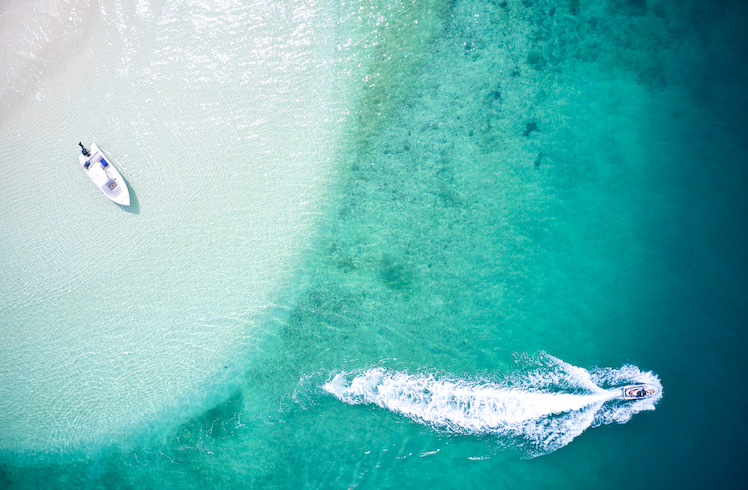
Dealing with Phuket's taxi mafia
From taxis and tuks-tuks to airport minibus shuttles, Phuket’s infamous “taxi mafia” has a grip on everything. This coalition of drivers ensures that fares on the island are wildly inflated compared with the rest of Thailand. When Grab (the local version of Uber) began in Phuket its staff were regularly harassed, threatened, and even assaulted by taxi drivers, who didn’t want their monopoly to end.
Once again, the safest option is to organize all transport through your hotel, including airport transfers. The hotel will have its own drivers who are far less likely to rip you off.
Boat trips can be deadly
In 2018, nearly 50 foreigners died after two tourist boats sank during a storm off the coast of Phuket. While the scale of that tragedy was unprecedented, tourist boat accidents are very common in Thailand. That 2018 disaster made headlines worldwide and prompted Thai media to highlight major safety shortcomings on such vessels, which are often overcrowded and lack sufficient life vests or functional fire extinguishers.
Such problems are more common on the cheapest boats, like low-cost ferries, onto as many passengers as possible are squeezed on by operators. The luxury versions of ferries and tourist boats are much safer options, as they’re not as crowded, have higher quality safety equipment, and better-trained crew.
How to eat safely
Many foreign travelers to Southeast Asia have their holidays spoiled by food poisoning. Hygiene standards and ingredients in Thailand can be very different from what Westerners are used to. While there’s no way to absolutely avoid getting an upset stomach, but you can certainly minimize the risk.
Eating Thailand’s famously tasty and cheap street food is one of the joys of visiting Phuket. Stay safe by avoiding the stalls that have pre-cooked food sitting in trays. You can’t be sure how long those dishes have been sitting there accumulating bacteria. Instead, order a specific dish from the menu and have it cooked fresh, right in front of you.
Washing your hands regularly, drinking water filter bottles, and avoiding ice in drinks might also help.
Dangers for female tourists
Phuket is quite a safe destination for female travelers, who are unlikely harassed because of how they’re dressed and don’t have significant issues with violent street crime. The two biggest criminal threats to female tourists in Phuket are drink spiking and scams.
While it is not particularly common, Thai media have reported incidents of sedatives being slipped into the drinks of female tourists at bars and nightclubs. So, it’s advisable to always keep your drink in your hand. Meanwhile, scammers in Phuket tend to choose victims they consider less likely to respond with anger or violence, and this makes female tourists a preferred target.
Other scams to watch out for in Phuket
Always change money at your hotel or a bank to avoid the sleight-of-hand thefts that can occur at Phuket’s small currency exchange businesses.
When visiting local temples or tourist attractions, be wary of anyone who approaches you before you enter claiming the venue is closed, that you’re dressed inappropriately, or that you need to pay them an entrance fee. These are often the opening gambits of a scammer who, it just so happens, tends to have excellent English.
When looking for transport outside of a tourist attraction or busy hotel, it’s better to flag down a passing taxi than to hop into one that’s already waiting at this exit. Phuket’s most unscrupulous taxi drivers target such heavily-touristed locations and will wait there patiently until they get a passenger who agrees to their hugely inflated fares.
Phuket has a Tourist Police force. A mixture of Thai and foreign nationals, these guys can be called in an emergency and are good to speak with if you have any questions about your safety or how to go about things whilst in Phuket.
- Phuket Tourist Police: Call 1155 or go here for more information.
- Find out how to navigate a bribery situation in Thailand.
Related articles
Simple and flexible travel insurance
You can buy at home or while traveling, and claim online from anywhere in the world. With 150+ adventure activities covered and 24/7 emergency assistance.
Get a quote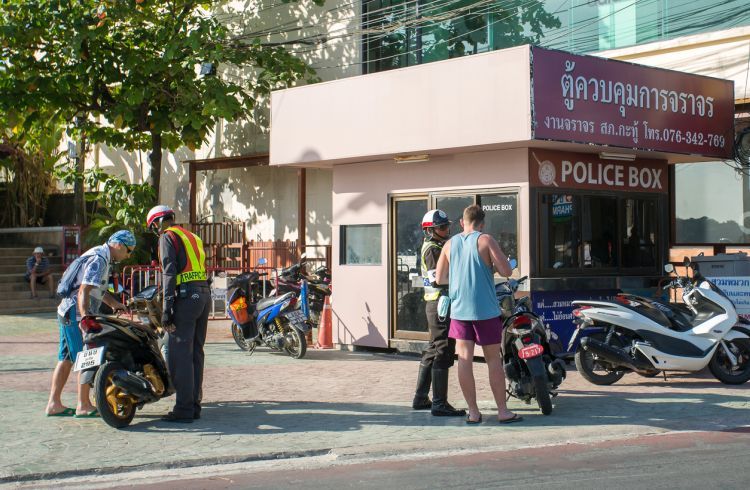
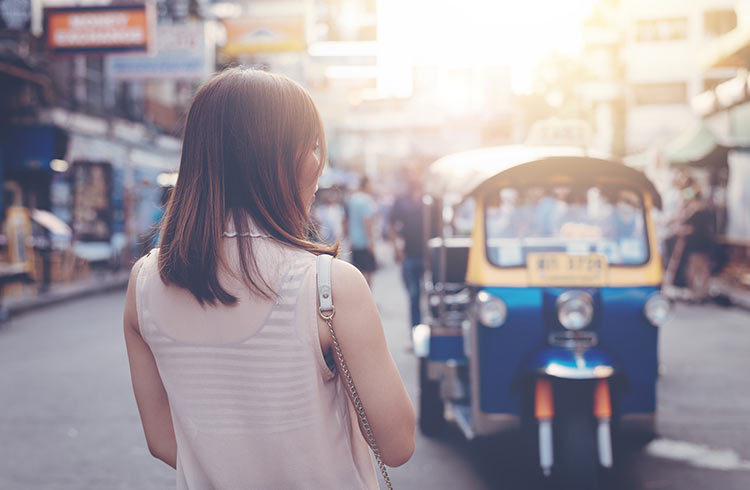
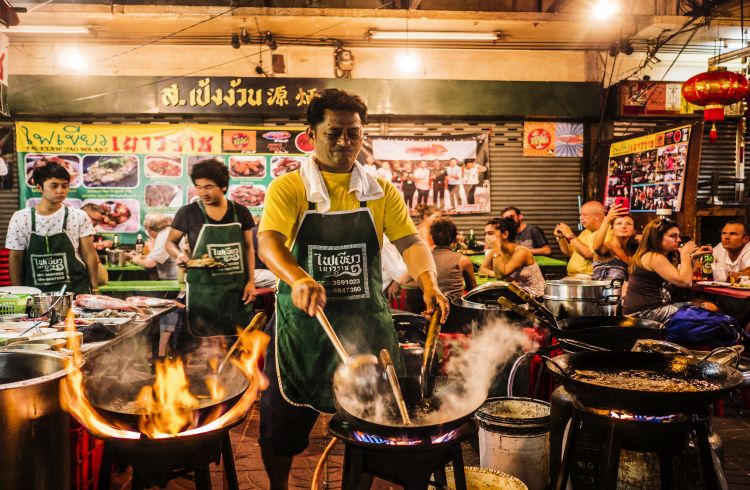
2 Comments